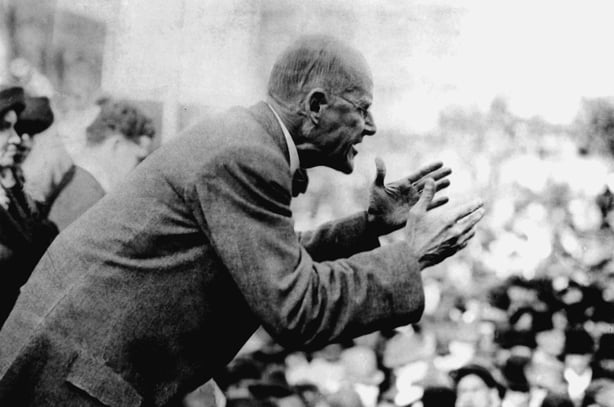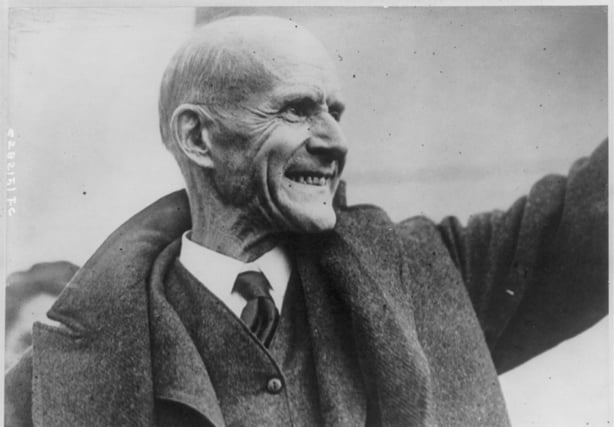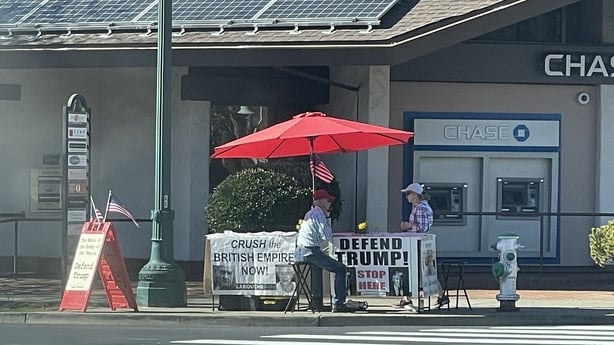Analysis: Two convicts previously ran for the White House from behind bars so there is precedence for a Trump jailhouse candidacy
Having become the first former US president to be found guilty in a criminal court, Donald J. Trump is in an usual position for a presidential candidate: there is a very real (if slim) chance that he will be in prison on election day. But while Trump is a man of many firsts, he wouldn't be the first man to run for president from a jail cell - In fact, he wouldn’t even be the second.
Should Trump be tried, convicted and jailed before the election in November, he would join two others with this dubious distinction. One, Eugene V. Debs, was a Socialist leader and activist who ran for president from a Georgia jail cell in 1920 after speaking out against World War I. The other, Lyndon LaRouche was a far-right conspiracy theorist who ran in 1992 while in a Minnesota prison for tax evasion, mail fraud and other charges.

Debs was a prominent Socialist, labour organiser, and pacifist. Born in Terre Haute, Indiana, in 1855, Debs left school at 14 and found work in a railroad yard, joining the Brotherhood of Locomotive Firemen in 1875, and serving a single term in the Indiana General Assembly as a Democrat in 1885. He helped organise the American Railway Union in 1893 which was notable at the time for including both skilled and unskilled workers in stark contrast to the American Federation of Labor which explicitly excluded unskilled and most non-white workers from its membership. Jailed for his role in the 1894 Pullman Strike, Debs spent much of his six month sentence corresponding and meeting with Socialists from across the United States and, upon his release, became an active member in the Socialist movement.
He was a skilled orator, passionate labour activist and political organiser and ultimately ran for president five times on the Socialist ticket. He first ran in 1900 and won 87,945 votes and would run again in 1904 (402, 810 votes, 3% of the vote), 1908 (420,852 votes, 2.8% of the vote), 1912 (901,551 votes, 6% of the vote), and, finally, in 1920 (914,191 votes, 3.41% of the vote). A national figure, Debs was incredibly popular and his personal appeal as a candidate consistently outstripped the popularity of his party which had its highest membership of 135,000 in 1911 only a year before Debs would receive over 900,000 votes for president.
From Voices of a People's History of the United States, actor Mark Ruffalo reads Eugene Debs' famous Canton, Ohio speech
In June 1918, Debs travelled to Canton, Ohio to speak at a socialist rally to address the Ohio Socialist Party convention. During the speech, Debs was very careful not to explicitly critique US policy or President Woodrow Wilson as doing so would violate the 1918 Sedition Act, an amendment of the 1917 Espionage Act. The act made it illegal, among other things, to "willfully utter, print, write, or publish any disloyal, profane, scurrilous, or abusive language about the form of government of the United States, or the Constitution of the United States." Even as he explicitly recognised the risks he faced, that "I may not be able to say all I think,"
Debs went on to offer a blistering critique of war in capitalist society but, despite his careful phrasing Debs was soon arrested, tried and found guilty. Sentenced to ten years in prison, Debs defiantly restated his fundamental opposition to the social, economic, and political systems in the US and explicitly allied himself with the nation's critics and workers: "while there is a lower class I am in it, and while there is a criminal element I am of it, and while there is a soul in prison, I am not free."
Debs and his allies spent the next few months appealing his case, with its final hearing before the US Supreme Court. Ruling against him, the justices found that while Debs did not urge his listeners to resist the draft in so many words, but that the "probable effect" of his words was exactly that and upheld the original conviction.

While in prison (first in West Virginia and then in Georgia), Debs remained active in Sociality Party politics. Despite long-simmering tensions between the party’s radical and conservative wings, Debs was still respected by leaders on both sides, so was the party’s unity candidate in the 1920 presidential election. Unable to campaign himself – prison authorities permitted him one press release a week – surrogates travelled the country on his behalf and Debs ultimately received 914,191 votes.
Eventually released along with 23 other political prisoners on Christmas Day, 1921, Debs returned to Terre Haute where he tried to recover his health and remained active in Socialist politics until his death in 1926. Debs is still revered within the US labor movement and his case (along with those of his fellow prisoners) is at the core of the modern understanding the First Amendment in the United States.
In contrast to Debs, the second man to run for president from jail was a libertarian and far right conspiracy theorist. Lyndon LaRouche was born in 1922 in Rochester, New Hampshire and briefly attended Northeastern University in Boston. Raised a Quaker, he was a conscientious objector during World War II and joined the Socialist Workers Party (a Marxist group founded in 1938 supporting Trotsky over Stalin after Lenin’s death) in 1948.
From Vice News, profile of Lyndon LaRouche, the conspiracy theorist who ran for president 8 times
He moved to New York City a few years later and was active in far-left politics with ties to the movement’s more extreme and violent elements. After his wife left him for one of his English followers in 1972, LaRouche’s politics became increasingly extreme and violent, while at the same time drifting further and further to the right.
By 1976 and his first campaign for US president, LaRouche was firmly on the extreme right of the political spectrum promoting conspiracies about economics, US foreign policy, the Rockefeller family, as well as attacks on "British and Zionist agents". He would later claim that the UK's Queen Elizabeth was active in the international drug trade and that Henry Kissinger was a Soviet agent.
LaRouche ran on a similar platform, although with varying party affiliations, for the next seven elections. While he never received more than a tiny fraction of votes – his best showing was in 1984 with 76,773 votes – this perpetual campaigning proved lucrative for his organisation as he consistently qualified for federal matching funds which brought in millions of dollars. Still more funds came in through individual donations, publications and allied businesses and think tanks in the US and abroad.

LaRouche’s finances caught up with him 1986 as a federal investigation into credit card fraud and obstruction of justice resulted in an October raid on his compound in suburban Virginia. At their 1988 trial, he and thirteen others were convicted of mail fraud and conspiracy. LaRouche was sentenced to 15 years in jail but was released on parole in 1994 after serving five years. While in prison, LaRouche ran for president again in 1992, receiving 26,334 votes (0.02% of the vote) . Paroled in 1994, LaRouche would remain active at the fringes of US politics until his death in 2019.
While very different from each other – Debs was a radical, a socialist and a nationally-respected leader, while LaRouche was the head of what the conservative Heritage Foundation has described as "one of the strangest political groups in American history" – they have some important similarities in this case. Both men started their campaigns while in jail and so their supporters were not surprised to be voting for convicts. Perhaps most relevantly, neither represented one of the country’s major parties or had a meaningful chance of winning, so the question of what happens when a convict is elected president is still unanswered.
Follow the RTÉ Brainstorm WhatsApp channel for all our stories and updates
The views expressed here are those of the author and do not represent or reflect the views of RTÉ






